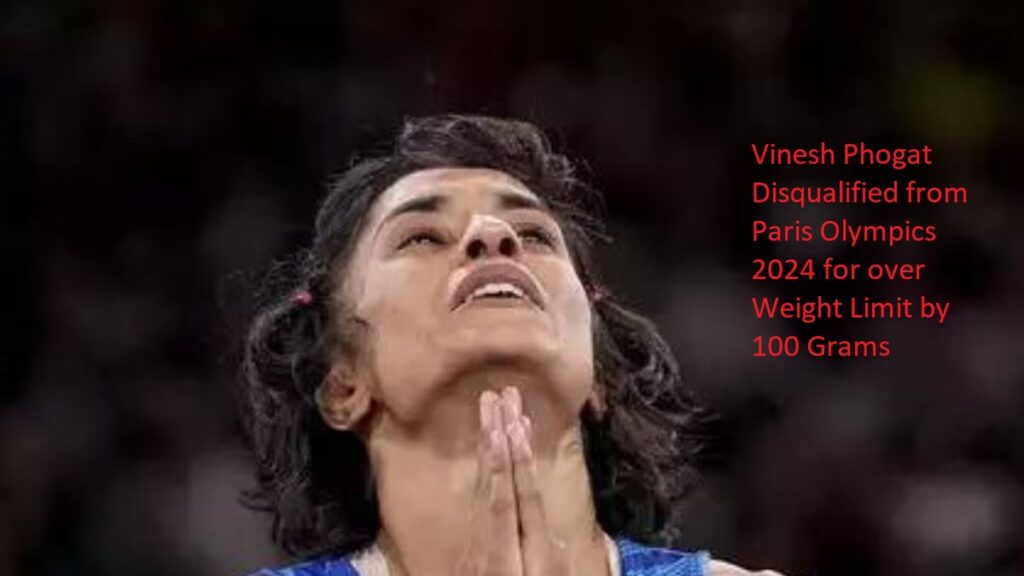
In a shocking turn of events at the Paris Olympics 2024, Indian wrestling sensation Vinesh Phogat has been disqualified from the competition for exceeding the weight limit by a mere 100 grams. This unexpected turn of events has sent shockwaves through the wrestling community and has sparked a heated debate about the stringent regulations surrounding weight management in professional sports.
Vinesh Phogat, who had been a strong medal contender in the women’s wrestling category, was poised to make history at the Paris Olympics. Her dedication, skill, and relentless training has positioned her as one of India’s most promising athletes, and her disqualification has left the nation reeling in disbelief.
The controversy began when Phogat stepped onto the scales for the weigh-in ahead of her scheduled match. To the dismay of her supporters and the wrestling fraternity, it was revealed that she exceeded the permissible weight limit by a mere 100 grams. This seemingly insignificant margin resulted in her disqualification from the highly anticipated event, leaving her dreams of Olympic glory shattered.
The decision to disqualify Vinesh Phogat has ignited a fierce debate about the strict regulations that govern weight management in professional sports. Many have argued that the 100-gram margin should not have warranted such severe consequences, especially considering Phogat’s exceptional track record and her dedication to the sport.
Supporters of Phogat have expressed their outrage on social media, with hashtags such as #JusticeForVinesh trending worldwide. They have called for a revaluation of the rules and have highlighted the need for a more nuanced approach to weight management in sports. Some have even gone as far as to accuse the organizing committee of being overly rigid and unsympathetic to the challenges faced by athletes in managing their weight.
On the other hand, proponents of the strict weight regulations have defended the decision, emphasizing the importance of maintaining a level playing field in competitive sports. They argue that rules exist for a reason and that deviation from these regulations, no matter how small, undermines the integrity of the sport. This viewpoint underscores the necessity of upholding the standards set by governing bodies to ensure fair competition for all athletes.
Amidst the fervent discussions and impassioned arguments, Vinesh Phogat has remained remarkably composed. In a statement released through her representatives, she expressed her disappointment at being disqualified but also conveyed her respect for the rules and regulations of the sport. Her dignified response has earned her widespread admiration and has further fueled the call for a review of the existing guidelines.
The controversial disqualification of Vinesh Phogat has brought to the forefront the complexities of weight management in professional sports. Athletes often undergo rigorous training and adhere to strict dietary regimens to achieve their optimal weight for competition. However, the margin for error is slim, and the repercussions of exceeding the weight limit, even by a small margin, can be devastating.
This incident has prompted calls for a revaluation of the existing weight regulations in sports, with many advocating for a more lenient approach that takes into account the unique challenges faced by athletes. The need for a more empathetic and understanding framework that supports athletes in their pursuit of excellence has been underscored by Phogat’s disqualification.
As the wrestling community grapples with the aftermath of this unprecedented event, the focus has shifted to the future of weight management in sports. The debate continues to gain momentum, with stakeholders from across the globe engaging in dialogue about the need for a more balanced and compassionate approach to regulating weight in professional athletics.
The disqualification of Vinesh Phogat from the Paris Olympics 2024 has ignited a fervent discussion about the weight regulations in sports. The outcry for a more empathetic and understanding framework that supports athletes in their pursuit of excellence has gained momentum, and the wrestling community eagerly awaits the outcome of this pivotal conversation.

